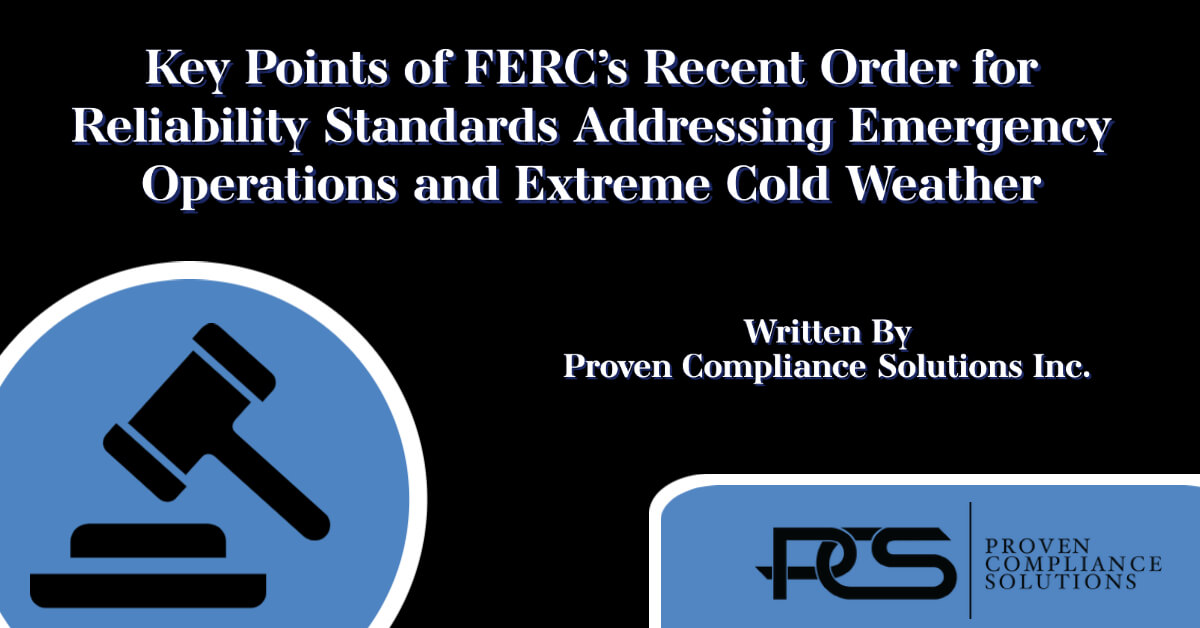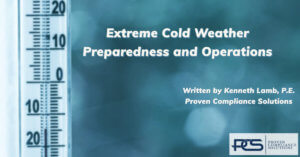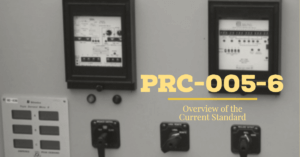Are you confused by FERC’s recent Order regarding NERC Standards EOP-011-3 – Emergency Operations and EOP-012-1 – Extreme Cold Weather Preparedness and Operations and the associated documents? If so, you’re not alone. Below is a summary of the key points of FERC’s Order.
Evolution from the EOP-011-2 – Emergency Preparedness and Operations Standard
EOP-011-3 and EOP-012-1 are both associated with the current EOP-011-2 Reliability Standard.
- R7 and R8 in EOP-011-2 are applicable to the GO/GOP Functions.
- EOP-011-3 will not include R7 and R8 from EOP-011-2.
- The EOP-011-3 Reliability Standard will not be applicable to the GO/GOP Functions.
- EOP-012-1 is applicable to the GO/GOP Functions and includes the content of R7 and R8 from the EOP-011-2 Standard (but under different Requirement numbers (R3 and R5 respectively) with the verbiage differing slightly to include extreme weather).
The Outcome of FERC’s Order
What Was and Wasn’t Approved?
- FERC issued its Order on February 16, 2023 approving the Standards.
- FERC deferred its decision to approve the effective date of EOP-011-3 (and proposed retirement of EOP-011-2) until NERC submits its revised applicability section for EOP-012.
FERC indicated that allowing EOP-011-2 requirements to remain mandatory and enforceable until such time as the revised applicability is effective for EOP-012 will ensure all bulk electric system generating units are required to maintain cold weather preparedness plans.
Why? FERC is concerned that the new standard EOP-012-1, as written, will result in an inappropriate reduction in the number of generators that will have to comply with cold weather requirements.
What is the impact of this decision?
- EOP-011-2 (Effective 4/1/2023) will remain in effect until a satisfactory version of EOP-012 is approved and goes into effect. Once EOP-011-2 is retired, EOP-011-3 will become effective.
- The effective date for EOP-012-1 was approved (10/1/2024), but portions of the standard, its applicability, and implementation plan will be revised prior to that date. In effect, EOP-012-1 as currently written will never go into effect. FERC’s directed modifications to EOP-012 are noted below.
FERC Directs NERC to Modify Multiple Portions of EOP-012-1
FERC indicated that while NERC’s proposed Reliability Standards may “provide new protections not currently found in any Reliability Standard,” EOP-012-1, in its current form, includes undefined terms, broad limitations, exceptions and exemptions, and prolonged compliance periods.
FERC found that EOP-012-1 requires improvement to address concerns, as noted below, and directed NERC to modify multiple portions of EOP-012-1, its Applicability, and its Implementation Plan. The modifications FERC is directing NERC to address include the following:
Modification to Applicability Section
Why? FERC indicated it understands that the proposed applicability criteria is meant to avoid “undue burden on those generating units that are not expected to operate in cold weather;” however, they found that excluded generating units should be the exception and not the rule.
What are the requested modifications?
- FERC directed NERC to modify EOP-012-1 to ensure that it captures all bulk electric system generation resources needed for reliable operation and excludes only those generation resources not relied upon during freezing conditions. Their directive to NERC is to clarify the language of the applicability section to align with NERC’s explanation of the entities that should already be preparing to comply with the Standard and should not need additional implementation time. Therefore, NERC should ensure the modified applicability section of EOP-012 is implemented as of the effective date of EOP-012-1 (10/1/2024).
Modifications to R1 and R7 to Address Concerns Related to the Ambiguity of Generator-Defined Declarations
Why? FERC has concerns related to the ambiguity of generator-defined declarations of technical, commercial, or operational constraints that exempt a generator owner from implementing the appropriate freeze protection measures.
What are the requested modifications?
- FERC directed NERC to include in the Standard: objective criteria on permissible technical, commercial, and operational constraints, to identify the appropriate entity that would receive the generator owners’ constraint declarations under EOP-012-1 Requirements R1 and R7, to describe how that entity would confirm that the generator owners comply with the objective criteria, and to describe the consequences of providing a constraint declaration. FERC directed NERC to modify the Standard to ensure that declarations cannot be used to opt out of mandatory compliance with the Standard or obligations set forth in a corrective action plan.
Modifications to Clarify R1 Regarding Generators that are Technically Incapable of Operating for 12 Continuous Hours
Why? FERC has concerns that the requirement as written is unclear whether new intermittent units will be considered by all generator owners as being capable of operating for at least 12 continuous hours, and thus, must comply with the Requirement.
What are the requested modifications?
- FERC directed NERC to modify the Standard to clarify Requirement R1 to ensure that generators that are technically incapable of operating for 12 continuous hours (e.g., solar facilities during winter months with less than 12 hours of sunlight) are not excluded from complying with the Standard.
Modifications to the One-Hour Minimum Operating Capability in R2
Why? Under R2, each generator owner is required to “ensure its generating unit(s) add new or modify existing freeze protection measures, as needed, to provide the capability to operate for a period of not less than one (1) hour at the unit(s) Extreme Cold Weather Temperature.” FERC found that the one-hour continuous operations requirement in R2 is too short of a period to adequately meet the purpose of the Standard to ensure generating units “mitigate the reliability impacts of extreme cold weather.”
What are the requested modifications?
- FERC directed NERC to modify the one-hour continuous operations requirement of R2.
Modifications to R7 to Include Deadlines for Implementation Completion of Corrective Action Plans
Why? EOP-012-1 does not require a deadline for, or a maximum duration of, corrective action plan implementation completion. FERC is concerned that the lack of a time limit for implementation completion of corrective action plans could allow identified issues to remain unresolved for a significant and indefinite period.
What are the requested modifications?
- FERC directed NERC to modify R7 to include deadlines for implementation completion of corrective action plans, as recommended in the November 2021 Report issued by FERC/NERC/Regional Entities regarding the February 2021 Cold Weather Outages in Texas and the South Central United States.
Modifications to EOP-012-1 Implementation Plan
Why? FERC is concerned that generator owners will not have to implement freeze protection measures for existing generating units to provide them with the capability to operate for the specified durations at the Extreme Cold Weather Temperature under proposed R2 until 60 months from regulatory approval. Further, FERC found that a phased compliance within the implementation time for R2 will also reduce reliability risks.
What are the requested modifications?
- FERC directed NERC to modify the 60-month implementation plan for existing generating units. Although they are giving NERC the discretion to determine what the effective date should be shortened to, they also emphasized that industry has been aware of and alerted to the need to prepare their generating units for cold weather since at least 2011.
- FERC also directed NERC to modify the implementation plan for R2 to require a staggered implementation for existing unit(s) in a generator owner’s fleet with an effective date of less than 60 months from regulatory approval.
FERC’s Timeline for NERC to Modify EOP-012-1
FERC directed NERC to submit a revised EOP-012-1 that addresses its concerns no later than 12 months after the date of issuance of its February 16, 2023 Order.
Bottom line, some version of EOP-012-1 will go into effect on 10/1/2024. Exactly what this new version of EOP-012-1 will require may not be completely clear until spring of 2024. Based on all of the potential tasks and obligations associated with the Standard, PCS recommends Entities begin their planning process for compliance with this Standard and drafting of potential revisions to their Plans.






